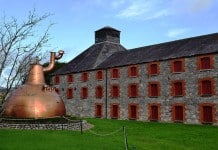
What is the difference between Scotch and Whiskey? This is a question often asked by whiskey enthusiasts who wonder just how similar these two drinks may be.
Key Difference Between Scotch and Whiskey
The most obvious answer and key distinction is that they come from two separate countries.
Whiskey is Irish and Scotch is Scottish.
Keen-eyed observers will notice that Scotch ‘Whisky’ and Irish ‘Whiskey’ are also spelt differently (this does not take into account America’s more recent development which is named completely differently as ‘bourbon’).
So… is Scotch whiskey? Nope, it’s whisky.
But in addition to these differences, Scotch and Whiskey are manufactured using different ingredients and with different production methods, resulting in two spirits that are alike, yet with significant distinctions.
Scotch Whisky Ingredients
The main ingredients in Scotch whisky is malted barely and water. Yeast is used in the fermentation process and sometimes peat smoke is added for flavour.
Irish Whiskey Ingredients
Irish whiskey is also based on malted barley. It also contains variations of unmalted cereal grains – usually corn, wheat or barely.
Scotch Vs Whiskey – Different Manufacturing Process
The two products can be distinguished right from the start of the manufacturing process as they are made using different grains.
Whisky in Scotland is made solely using malted barley, whereas Irish whiskey is made using other grains too.
It is quite normal for distilleries in Ireland to utilise a mixture of unmalted and malted barley, usually in proportions of 60:40.
This is partly because, historically, malted barley was very expensive in Ireland so distillers sought cheaper options, but also because it results in a lighter flavour.
Distilleries in Scotland also process the raw grains slightly differently.
Here the barley is soaked to encourage germination, before using peat fires to dry it out.
This gives Scotch the peaty smoky flavour that is stronger than that of Irish Whiskey, where wood is more commonly used.
Hence, Irish whiskey has a smoother finish as opposed to the smoky, earthy overtones common to Scotch whisky, which is in part due to this peating process.
Scotch Vs Whiskey – Different Distillation Process
The two spirits are distilled in slightly different ways too.
The stills used vary, with Scotch distilleries commonly using larger stills in a wide variety of shapes. Although the Scots produce all single malts in copper pot stills.
In Ireland much of the whiskey is distilled in pot stills, which are short, squat round stills that give a broader flavour.
The use of these stills in conjunction with a mixture of malted and unmalted barley resulted in one of Ireland’s most distinctive blends, pot still whiskey.
In addition, most whisky in Scotland is distilled twice whereas with Irish Whiskey the process is usually undertaken three times. There are exceptions to this… for eaxample Lowland Scotch malts use triple distillation just like the Irish do. Also, the Spingbank distillery in Campbeltown, distills Spingbank 2-1/2.
This extra step in the distillation process results in a lighter drink which typically has a smoother flavour.
Significant Differences to Precious Traditions
Both countries have a long tradition of producing spirits and they are an integral part of both Scottish and Irish heritage.
Although the two drinks are broadly similar, there are significant differences between them that appeal to a variety of palates.
Common Irish Whiskey Brands
- Jameson Irish Whiskey
- Bushmills
- Tullamore D.E.W.
- Midleton
- Powers
Common Scotch Whisky Brands
- Johnnie Walker
- Glenlivet
- Glenfiddich
- Ballantines
- The Famous Grouse
Whisky Vs Whiskey
Both hugely popular in their own right on the global market, remember that the main difference between Scotch and Whiskey is their country of origin. Now you know.
As a world export, Irish Whiskey has even been awarded with legal status that guarantees if it says ‘Irish Whiskey’ on the bottle it has been manufactured in Ireland, like ‘Champagne’ or ‘Cornish Pasties’!
Jameson Irish Whiskey continues to be the world’s most popular Irish whiskey with sales of 6.5 million nine-litre cases in the last 12 months.




